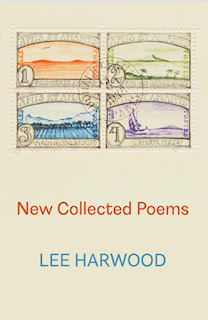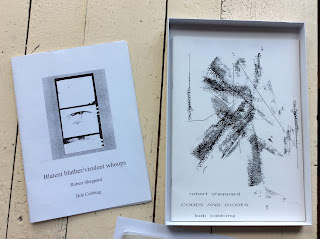Published today! Alexandra Ault and Larua Walker: Poems in Progress: Drafts from Master Poets, London: British Library, 2002: Bookshop - British Library Online Shop (bl.uk)
See here: https://shop.bl.uk/collections/bookshop
This is an
interesting book, which I have received as the literary executor of Lee
Harwood’s estate (he’s in it; more of that later). The British Library (for
text, sound and video) are undergoing exciting developments, which will involve
all kinds of archives going online. They have a copy of my tape cassette
magazine 1983 (from the mid-1970s), and have digitalised some of the
contents of number two, a whole side of Lee Harwood and even an early
multi-tracked studio piece by me, ‘The Lover’. (Yes, I did know how to edit
tape back then.) This is good, but it is a shame that nobody can locate
the Master Tapes for 1983 which I donated to the National Sound Archive
years ago, but are not in the collection now. (They also have a recording of
the Allen Fisher Poetry Buzz, which I write about here, and Patricia and I are
both on that: https://robertsheppard.blogspot.com/2005/07/poetry-buzz-bus-ride-withand-for-allen.html.
) And loads of other stuff!
For now, we have this book. It is fascinating, although not all of the texts are drafts, and are in fact manuscript copies or special editions. Of course, there have been excellent draft-editions before now, notably of Eliot’s The Waste Land. There are ancient texts as well as a few contemporary poets, from Hafiz to Rebecca Goss. The contemporaries (while not always to my taste) show their workings-out in public, which is generous. Manuscript copies of already published poems don’t excite much, but two glimpses of Coleridge’s notebooks, Blake’s scribbles, war poets’ drafts, Eliot’s letters, Sappho’s papyrus, EBB’s sonnets, Lewis Carroll’s original ‘Alice’ book with images, Gascoyne’s translation of Jean Follain, Andrew Salkey’s typescript for a printer, etc, etc, are fascinating enough to make this an entertaining book.
This is it,
as it will appear in our book. A taster:
Train poem – A collaboration
dog daisies poppies metal knitting
needles snail eyes backward
and then discord the records-file
prehensile tankers and block
which way the stage perimeter OK
block again greenhill rears upward mutinous
‘back!’ So until January
telegraphs twitching north to so and so
and a handkerchief slowly chopping heaves
‘ne nous fachons pas’ so that the houses
laughing in your eyes nearer the bang
let a forest caress unlace the instant
lovecog – did you really understand what I meant by
that?
the farmyard in an uproar of freed peasants’ cough
drops
ah the old dogs at the window
but my love for you outgrew the shed
tools in disorderly heaps and wasps
a beam sagging into twisted visions of nowhere
and at this the small engine appeared from the siding
to inspect the phantoms and slowly disappear.
What is
different about the draft manuscript version is that we can see who wrote what.
(Maybe that wasn’t the intention, because Lee doesn’t even tell us who the
collaborator is! Perhaps as in some of my collaborations (about which I write
here: https://robertsheppard.blogspot.com/2020/01/robert-sheppard-thoughts-on.html ), Harwood and Ashbery wanted to
become the third author without differentiation, or perhaps they didn’t. Indeed, also printed here is a typescript of the poem, with Ashbery's contributions underlined. But to
see the manuscript you will have to obtain the book, I’m afraid. The spacing is
quite different from the published version. Neither Mr Corcoran nor myself can
tell you what a ’lovecog’ is, but I can reveal that that phrase is in Lee’s
handwriting!
The Bob Cobbing contribution is his 1951 notebook ‘Two Experiments’, and one is a word list for the now familiar (and oft performed) ‘WORM’, the other a contemporary word-list poem-draft, ‘Snow’. You can hear the eventual sound poem ‘Worm’ from about ten years later on the video below. There follows a fair description of Cobbing’s procedures, and we read the exciting information that the BL has over 300 reel-to-reel recordings of his work (as well as other recordings, such as my edition of 1983 number two which I speak of above). There is a later visual text printed too, which is odd because 'WORM' also exists as a visual poem (again, Cobbing waited for 10 years until duplicator technology enabled overprinting).
My
collaborations with Cobbing are now published by Veer. See here: Pages: COLLABORATIONS (Bob Cobbing
- Robert Sheppard) published in a box by Veer - out now.
Thinking of recordings, I have a cassette recording of Verse and Perverse and Bob and I did record a video together of Blatant Blather/ Virulent Whoops, the two texts in Collaborations. That might be in the collection. The cassette tape is destined for my archive, I suppose, unless it gets lost.
All of the catalogues of the BL collections may be consulted online.
The BL also archives this blog.
The New Collected Poems of Lee Harwood is NOW available. HERE: Lee Harwood - New Collected Poems (shearsman.com)









